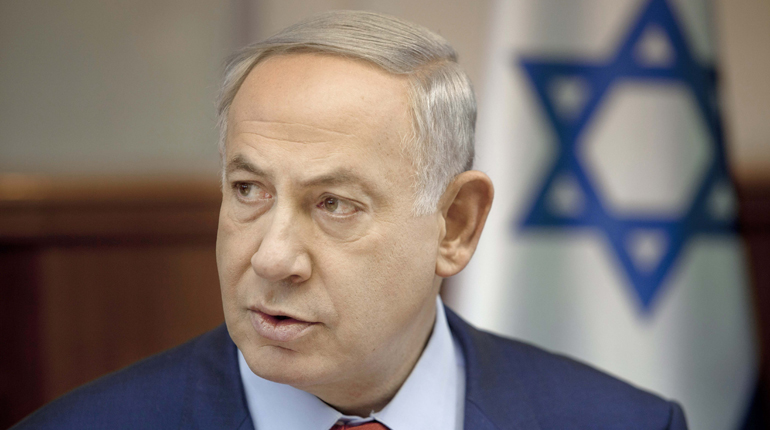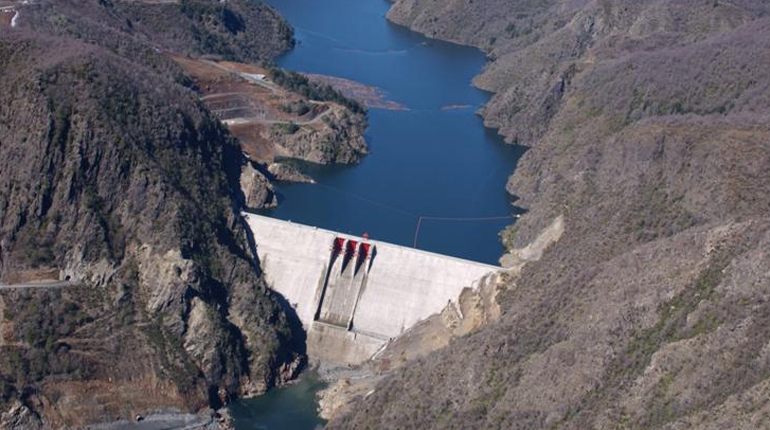Israeli gas deal heralds new dawn for upstream players
Israel has finally signed its gas framework into law after a year of delays, to the relief of upstream developers Delek Group and Noble Energy.
 Netanyahu at a weekly Cabinet meeting in November. The Israeli PM has bypassed the Antitrust Authority. (PA)
Netanyahu at a weekly Cabinet meeting in November. The Israeli PM has bypassed the Antitrust Authority. (PA)
A rapprochement with Turkey and the signing of the natural gas framework should be the boost Israel’s energy sector needs after a series of unfortunate events involving Egypt.
Israeli Prime Minister Benjamin Netanyahu signed the gas framework into law on Thursday, using an obscure legal mechanism to bypass the Antitrust Authority (ATA), which exactly a year earlier had scuppered deals with Israel’s Delek Group and US producer Noble Energy.
The regulations came into effect immediately, but they will still have to pass through the High Court of Justice. This will happen in February, but no source spoken to by Interfax thought there would be any substantial further delays.
Noble said in a statement afterwards that it would immediately restart plans for the expansion of the Tamar field and development of Leviathan, both of which had been put on hold until the regulations were in place.
A source at Delek, who wished not to be named, said FIDs for both projects were likely to be made in the second half of 2016, given that financing needed to be put in place and sales contracts settled.
The source added that discussions with BG Group and Union Fenosa Gas to supply gas from both fields to the Idku and Damietta LNG plants were continuing, but could not say when they would close.
Nati Birenboim, chief executive of consultancy Tamuz Group, told Interfax both players can now begin talking to Israeli companies as well, something they had been barred from doing while the ATA was deliberating over the framework.
Keith Elliott, Noble’s senior vice president for the East Mediterranean, said in a statement the new legislation would allow the company to move forward with development planning, and that he was confident the two major fields would meet the needs of regional and Israeli customers. He did not mention plans for exports further afield.
Turkey accord
The preliminary deal reached between Turkey and Israel on Thursday opens the way to more potential customers for Israeli gas.
Relations between the two countries soured after the Gaza flotilla incident in May 2010, when nine Turkish activists were killed after the Israeli Navy boarded the ship they were using to try to break the Gaza blockade.
Israel has agreed to launch a compensation fund for the families of those killed, and in return Turkey will drop its claims against Israel. Talks over a gas pipeline and sales to Turkey were also part of the arrangement.
Turkish business groups have been lobbying their government since at least 2013 to be able to import Israeli gas, but the country already receives volumes from Azerbaijan and Qatar so Israel’s contribution would be small in comparison.
However, Turkey may become a more prospective market for Israeli gas than Egypt. Cairo is moving to insulate itself from future energy shortages by leasing three floating LNG terminals, accelerating major projects such as BP’s Atoll development and Eni’s Zohr field, and signing deals for piped gas with Iraq and electricity with Saudi Arabia.
Obstacles remain
Independent energy analyst Allison Good told Interfax the accord between Israel and Turkey has made gas exports more politically feasible, but several issues still have to be sorted out.
"Particularly the position of Cyprus, whose relations with Israel regarding energy have soured lately," she said.
"The other important thing to remember is that a political accord cannot force private companies to do anything. They will make the FIDs about Leviathan and a pipeline from Israel to Turkey, and only then will we know for sure whether energy cooperation will actually materialise."
Israel’s future gas sector has been dealt a series of blows over the past four months. Eni announced the discovery of the potentially 850 billion cubic metre Zohr field on the border of the Cypriot exclusive economic zone at the tail end of August.
Then, in early December, the International Chamber of Commerce awarded Israel Electric Corp. and East Mediterranean Gas Co. almost $2 billion in damages against Egyptian Natural Gas Co. and Egyptian General Petroleum Corp. for squeezing and then cutting off gas supplies in the years up to 2011.
Birenboim said Turkey was the solid market projects such as Leviathan needed for an FID. But in terms of whether the renewed relations would spur competition with Egypt, he said: "At the end of the day, it’s about pipelines."
Exporting gas to either country will require new pipelines to be built. Although this is part of the negotiations Noble and Delek are holding with BG and Union Fenosa Gas, no construction work has started yet.
Liked this article?
Sign up for exclusive, accurate and up-to-date natural gas news, analysis and intelligence, with global coverage of every phase of the gas chain.
By logging in or signing up for a free trial, you are agreeing to our terms and conditions, privacy policy and cookie policy.







